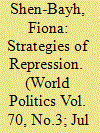|
|
|
Sort Order |
|
|
|
Items / Page
|
|
|
|
|
|
|
| Srl | Item |
| 1 |
ID:
161963


|
|
|
|
|
| Summary/Abstract |
In light of their nineteenth-century political economies, why did poor, agricultural Denmark become a leader in public, mass primary education (1814) and a multiple-track education system that included vocational training, while rich, industrial Britain did not create public, mass schooling until 1870, and embrace a one-track, academic secondary-education system? The author argues that literary narratives shed light on these cross-national differences. Danish narratives imagined education as social investment for a strong society; diverse educational tracks were necessary to meet the varied skills needs of the economy. British narratives portrayed schooling as essential to self-development and to cultivating the ideal individual. The author uses a close reading of texts and computational linguistics analyses of 521 Danish and 562 British works of fiction from 1700 to 1920 to document the different portrayal of education in the two countries. Case studies show that writers are crucial political actors in important reforms and understudied political agents in policy development stories. The method allows the author to evaluate empirically the complex relationship between culture and political outcomes, to falsify cultural claims, and to improve on thin, vague, national cultural arguments. The article shows how literature helps to reconcile the contradictions embedded in diverse models of governance. Literature provides a site for reworking cultural symbols in response to societal struggles over exogenous change, and provides a source of continuity at moments of institutional change.
|
|
|
|
|
|
|
|
|
|
|
|
|
|
|
|
| 2 |
ID:
161962


|
|
|
|
|
| Summary/Abstract |
How are processes of political development structured across space and time by preexisting institutions? This article develops a spatiotemporal theory of institutional change by analyzing the evolving infrastructural power of the European Union's legal order using geospatial methods. Specifically, the authors theorize that the pattern and pace of the domestic spread of EU law has been shaped by preexisting state institutions—particularly by the degree to which national judiciaries are hierarchically organized. To assess this claim, the article compares patterns of domestic judicial enforcement of EU law across France (a unitary state with a centralized judiciary), Italy (a weaker unitary state with a centralized judiciary), and Germany (a federal state with a decentralized judiciary). Developing a geospatial approach to the study of legal integration and historical institutionalism more broadly, the authors leverage an original geocoded data set of cases referred to the European Court of Justice by national courts to visualize how the subnational penetration of Europe's supranational legal order is conditioned by state institutions.
|
|
|
|
|
|
|
|
|
|
|
|
|
|
|
|
| 3 |
ID:
161961


|
|
|
|
|
| Summary/Abstract |
Strategies of repression vary widely between extrajudicial and judicial extremes, from unrestrained acts of violence to highly routinized legal procedures. While the former have received a great deal of scholarly attention, judicial methods remain relatively understudied. When and why do rulers repress their rivals in court? The author argues that autocrats use a judicial strategy of repression when confronting challengers from within the ruling elite. Unlike regime outsiders, who pose a common, external threat to mobilize against, insiders present a more divisive target. When autocrats confront the latter, a judicial strategy legitimizes punishment, deters future rivals, and generates shared beliefs regarding incumbent strength and challenger weakness. Using original data on political prisoners in postcolonial sub-Saharan Africa, the author finds that autocrats were significantly more likely to use a judicial strategy against insiders and an extrajudicial strategy against outsiders. A case study of Kenya traces the logic of the theory, showing how intraregime conflict made courts a valuable instrument of state repression. The findings demonstrate how courts can play a central role in autocratic survival.
|
|
|
|
|
|
|
|
|
|
|
|
|
|
|
|
| 4 |
ID:
161964


|
|
|
|
|
| Summary/Abstract |
Why do states adopt binding and enforceable democracy clauses at the regional level, thereby permitting neighboring states to monitor and potentially sanction their breaches of democracy? To answer this question, the authors test a set of hypotheses in two South American intergovernmental regional organizations, MERCOSUR and UNASUR. Following the epistemological and methodological requirements of process-tracing analysis, the authors conducted thirty-six interviews with top-level policymakers and decision makers who were responsible for the design and enforcement of the Protocol of Ushuaia (MERCOSUR), the Protocol of Montevideo (MERCOSUR), and the Protocol of Georgetown (UNASUR). The authors argue that actors formalize these provisions in response to threats to regime survival. Unlike international organizations for the protection of human rights, which rely on the delegation of power to institutions such as supra-state courts, democracy clauses are intergovernmental instruments whose enforcement relies on states’ capabilities. Because of this, the perceptions of governments regarding their own stability and their expectations regarding the future enforcement of the clauses against their own country are causally linked to the decision to support the adoption of the clauses. Thus, governments that perceive themselves as stable democracies or expect that they are too big to be sanctioned support the adoption of democracy clauses because these clauses are functional for others. Conversely, governments that perceive themselves as unstable democracies support the adoption of democracy clauses as functional for themselves. The authors contend that any such asymmetry of self-perceptions and expectations, together with regime protection, explain the move toward the formalization of clauses for the protection of democracy in member states within MERCOSUR and UNASUR.
|
|
|
|
|
|
|
|
|
|
|
|
|
|
|
|
|
|
|
|
|